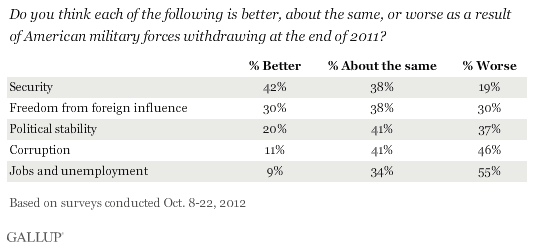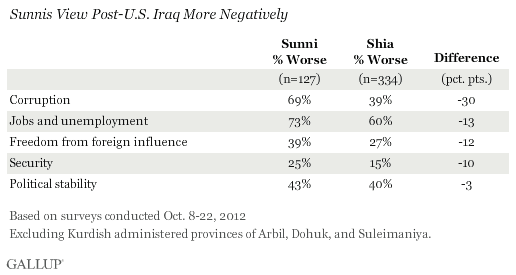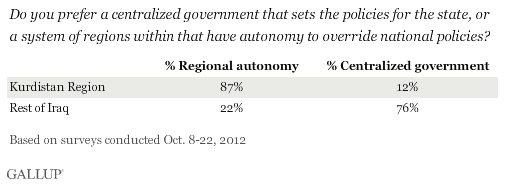WASHINGTON, D.C. -- A little more than one year after the last U.S. military vehicles exited their country, more Iraqis report security to be better (42%) than worse (19%) as a result of the U.S. withdrawal, according to a Gallup poll conducted in Iraq last October. While some military analysts feared that Iraqi security forces would fail to fill the security vacuum left in the absence of U.S. forces, which numbered 170,000 at their height, many Iraqis now perceive security to have been positively impacted by the U.S. departure. Still, Iraqis view the effects of the U.S. pullout on other issues more unevenly, with many saying the country's economic and political climate is worse as a result of the withdrawal.

The 10-year anniversary of the U.S.-led invasion of Iraq passes this month, with violence still down significantly from the darkest periods of Iraq's civil war in 2006 and 2007. Nonetheless, sectarian tension remains just under the surface, as al-Qaeda continues its bombing campaigns in Iraqi cities and tensions mount between Baghdad and the country's autonomous Kurdish region.
Sunnis More Likely to See Country as Worse Off After U.S. Pullout
Since the U.S. withdrawal, Iraq's Sunni and Shia communities have taken somewhat different views of the country's trajectory, with Sunnis seeing the situation in the country more negatively after the pullout.
In particular, Sunnis are significantly more likely than Shias to see corruption as worsening after the U.S. pullout -- 69% vs. 39%. And, 73% of Sunnis say the country's jobs and unemployment situation has worsened since the U.S. withdrawal, compared with 60% of Shias.
Sunni discontent with Iraq's direction may be a reflection of frustration with the country's Shia-dominated government, which major Sunni political parties have accused of engaging in sectarian politics following the departure of U.S. forces.

Most in Kurdistan Prefer Regional Autonomy
Another key area where U.S. forces may be missed is along Iraq's Kurdish-Arab fault line. Unresolved territorial issues between Baghdad and Iraq's Kurdish Regional Government (KRG) over "disputed territories" and the oil-rich city of Kirkuk intensified in 2012 without U.S. forces present to mediate differences.
Oppressed by successive governments in Baghdad prior to the U.S. invasion in 2003, there remains a wellspring of support in Kurdistan (87%) for a regional system of government with the power to override national policies.

Implications
The debate over the moral justification and lasting effects of the U.S. decision to invade Iraq is likely to continue for many years, even after the world marks the 10th anniversary of the initial invasion next week. However, the manner in which the war ended may prove equally significant to the lives of Iraqis and the thinking of experts in American foreign policy for decades to come.
The high percentage of Iraqis who say that the withdrawal of U.S. forces worsened the country's political stability, corruption, and joblessness shows that the U.S. occupation may have served to artificially suppress many of Iraq's political and economic challenges. Throughout its nearly nine years in Iraq, the U.S. government pumped more than $60 billion dollars into reconstruction in a bid to jumpstart the economy, a bubble which largely popped when American war efforts wound down. Meanwhile, until 2012, American diplomats and military leaders were able to influence political reconciliation among the country's diverse communities, an ability that U.S. officials lost after the withdrawal.
Worth noting, the only measure that Iraqis say has actually improved since U.S. forces left their country is security. This could signal that, at least in the war's waning years, the presence of U.S. forces may have served more as a force for instability, at least from a security perspective, as some militia and terrorist groups continued to operate in the country with the stated purpose of fighting foreign forces.
Iraq still faces a long and bumpy road to reach the political and economic stability that are the hallmarks of a functioning democracy. For the U.S., internalizing the lessons of how military forces can most responsibly extricate themselves from lengthy occupations may also prove key to its ability to fight similar wars in the future.
For complete data sets or custom research from the more than 150 countries Gallup continually surveys, please contact us.
Survey Methods
Results are based on face-to-face interviews with 1,000 adults in Iraq, aged 15 and older, conducted Oct. 8-22, 2012. For results based on the total sample of national adults, one can say with 95% confidence that the maximum margin of sampling error is ±3.9 percentage points. In the Kurdish region, 140 respondents were interviewed, with a margin of ±10.0 percentage points. Outside of the Kurdish region, 860 interviews were conducted with a margin of error of ±4.0 percentage points. The margin of error for Iraq's Shia sample is ±7.0 percentage points and ±10.9 percentage points for the country's Sunni sample. The margin of error reflects the influence of data weighting. In addition to sampling error, question wording and practical difficulties in conducting surveys can introduce error or bias into the findings of public opinion polls.
For more complete methodology and specific survey dates, please review Gallup's Country Data Set details.
